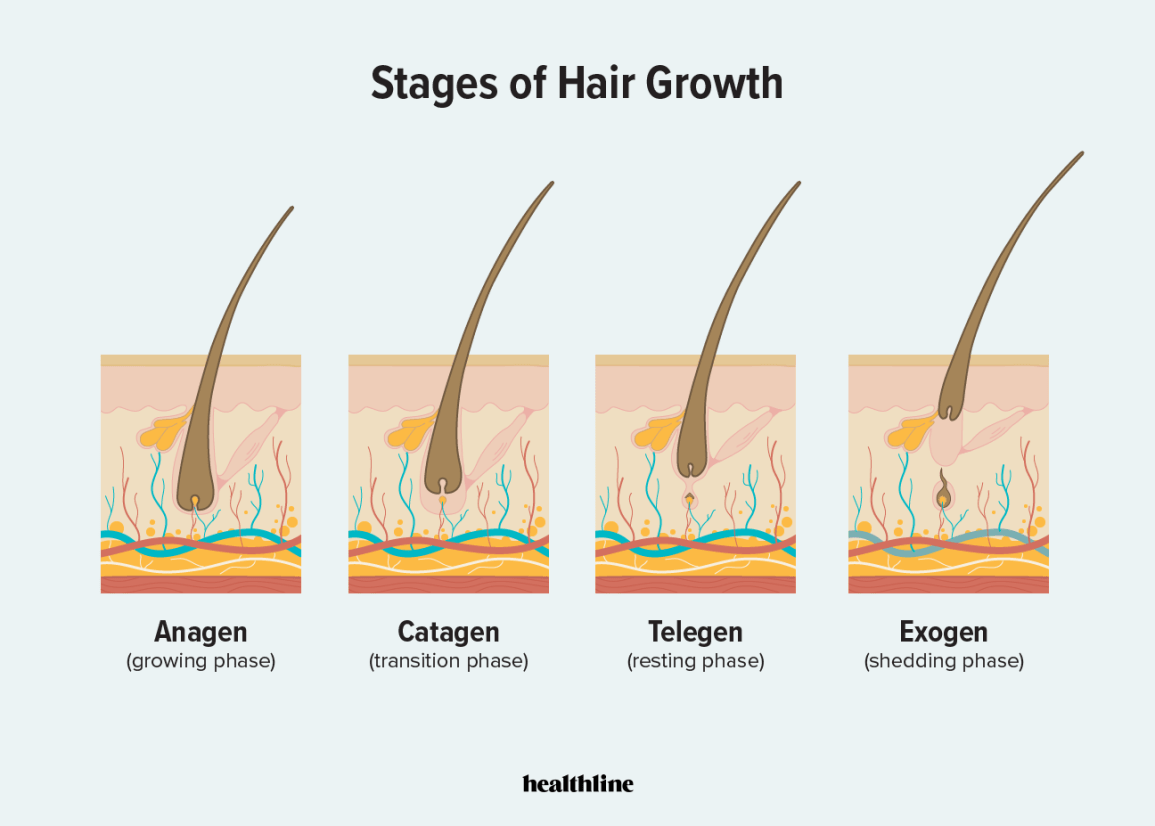Over the past year and a half, hair loss complaints have been at an all time high among our salon guests. A quick glance at social media and you’ll find people commiserating over losing their hair and desperately searching for answers and solutions. In your lifetime you’ve probably heard that stress can cause hair loss, but has anyone told you why or how to deal with it? In today’s post I’ll try to offer some education and some resources on this topic.
a quick primer on the hair growth cycle
The anagen stage is where the hair is growing. For scalp hair, this stage lasts an average of three to five years for most people. At any given time, about 90% of your strands are in the anagen phase.
The catagen stage is the transition phase. This short phase lasts about ten days where the follicles shrink and the hair begins to separate.
The telogen stage is a resting phase that lasts on average three to four months. Hair in this stage isn’t growing but it usually isn’t falling out either. Often times the shedding phase is lumped in with this resting phase completing the hair growth cycle, but scientists have separated that into another part called the exogen phase.
The exogen phase is when hair is shed from the scalp. Hair loss may be around 50 to 100 strands per day. Lasting two to five months on average, new hairs are beginning to form inside the follicles where the old hair is falling away.
the basics of telogen effluvium
Telogen effluvium is the technical name given to hair loss that occurs after a disruption of the hair growth cycle. It is the excessive shedding of resting (telogen phase) hairs after some shock or trauma to the body. Things that can shock our system and disrupt our hair growth cycles include childbirth (post partum hair loss), acute or chronic illness (especially with a fever), surgeries, extreme weight loss, poor sleep habits, certain medications, and psychological stress.
Hair lost during telogen effluvium is diffuse hair loss. This means it generally occurs throughout the whole head, unlike androgenic alopecia which may follow a certain pattern around the hairline and/or the top of the head.
With normal hair loss averaging 50 to 100 strands a day, those suffering telogen effluvium may experience hundreds of strands coming out at once. The hair loss may seem more pronounced when brushing or washing the hair, as the manual manipulation helps remove the hairs that are loosely resting in the scalp.
covid-19 and telogen effluvium
Hair loss has been commonly reported in covid-19 patients all around the world . Most are believed to be cases of telogen effluvium. There are many reasons why covid-19 could disrupt our hair growth cycle. Remember, any illness that comes with a high fever can trigger telogen effluvium. The body may push hair into the resting phase for conservation of energy so the immune system can work full force to fight off infection. Patients hospitalized due to covid-19 are likely to endure high levels of stress, and may also have to start and stop medications abruptly depending on the course of treatment required for their condition. During the peak of all this activity, the hairs may be sent into the resting phase but the actual loss of hair won’t be experienced until later. Because of this delayed response, some patients may not even connect the illness with their hair loss, especially if they have already made a full recovery.
telogen efflluvium without illness
If you’ve managed to avoid becoming ill during the pandemic, you may wonder how covid-19 can still play a part in your hair loss. Since the onset of the pandemic, stress has disrupted our lives in ways that were previously unimaginable. We’ve all been riding the waves of a very stressful storm, just in very different boats.
Healthcare workers have been overburdened caring for the masses of sick people with seemingly no end in sight. Small businesses had their doors closed for weeks or months. Even when businesses reopened, new challenges came such as navigating public health guidelines, dealing with illness and exposures among staff, and facing supply chain issues. Parents were forced to send their children to virtual school, juggle hybrid education, or switch to home schooling. Many people faced financial insecurities, lost their jobs and even lost heir health insurance. Even those who remained employed have faced extreme burnout due to staffing issues, unsafe work environments, and/or demanding customers.
If you really think about it, who hasn’t had some major stress during the past year? This degree of stress can cause panic attacks, general anxiety, depression, disruption of sleep patterns, changes to diet and activity levels, and can send people spiraling to unhealthy coping mechanisms. All of these things can disrupt the normal functions of the body and possibly trigger a telogen effluvium.
You may not feel as stressed now if things have improved, but that doesn’t mean you can escape the hair loss. If the hair growth cycle has already been disrupted, the shedding follows that several months later.
medical concerns about hair loss
It’s important to note that there are special cases where there may be medical concerns associated with hair loss. Diagnosing whether you have a telogen effluvium or something different may be challenging not only for a patient, but for clinicians as well. A doctor can ask about your health history and run tests to rule out other possible conditions like thyroid problems. A professional can look at your hair and scalp and evaluate how much hair is coming out, look for new short hairs that are growing in, and biopsy the scalp if necessary. Dermatologists may be able to offer treatments for hair loss depending on the diagnosis. If you are having other concerning symptoms with your hair loss, or your hair loss doesn’t resolve after some time I encourage you to speak to a medical professional. While we may offer a wealth of information for consideration, remember that your hairstylist is not qualified to diagnose a medical condition or give you medical advice.
a perfect storm for marketing products and supplements
The market for hair loss products and supplements is already valued at several billion dollars and is rapidly growing. A quick google search for “hair growth” will overwhelm you with ads for collagen drinks, biotin gummies, vitamins, shampoos and conditioners, prescription drugs, and even devices such as laser helmets. How can we know what possibly works and what doesn’t?
The first and most important thing I’d like to point out here is that most cases of telogen effluvium self resolve without any treatment. The best thing you can do is take care of yourself. Managing stress levels, consuming a balanced diet, living an active lifestyle, and getting plenty of rest are key to overall body wellness and should be a priority. With a case of telogen effluvium, most will see noticeable signs of recovery in 6-12 months, although it may take longer for hairs to regrow to full length if you have very long hair.
There are very few FDA approved drugs to treat hair loss. Minoxidil and finasteride are currently the only two. Minoxidil is the active ingredient found in Rogaine and Nioxin and similar products available over the counter. While these may be popular and come with few risks of use, they are not necessary for treatment of telogen effluvium and not everyone will see results using these products. These products appear very useful in treating androgenic alopecia (commonly known as aging related hair loss, male/female pattern baldness), but that’s a topic for another post.
Vitamin supplements for hair growth may be minimally effective (if at all) unless you’re suffering from some nutritional deficiency. Despite media hype leading to popularity among consumers, actual research doesn’t back the beauty industry’s biotin obsession. Biotin supplementation in otherwise healthy individuals seems to be clinically insignificant in the case of hair growth. On another note, biotin can actually interfere with a variety of lab tests including thyroid hormone tests. That is one example of why it is important to talk to your doctor about the supplements you are taking.
When it comes to collagen supplements, it appears the jury is still out. There is some conflicting evidence here. Collagen does play an important role in supporting healthy hair follicles and we know that factors such as aging, stress, and diet may lower collagen levels in our bodies. Many of the existing studies on collagen for hair growth have been undertaken by companies who sell supplements, so these may show weak data or strong bias. There is more research being done, but it doesn’t appear to be a quick fix for hair loss.
While many of the products and supplements on the market may be generally regarded as safe so it may not hurt to try, it can certainly get expensive and comes with no guarantee of results. Understanding the science behind why and how things work may help you determine if you feel it worthwhile to invest in any of these products. Having realistic expectations will also help you avoid disappointment and buyers remorse.
how a visit to the salon might be able to help
Regardless of what caused your hair loss or whether or not you seek medical intervention for it, trained beauty professionals may be able to help you look and feel better through the recovery process.
As a hairstylist, I enjoy using my knowledge to make product recommendations for my clients based on their needs. I can’t promise to sell you anything that will make your hair magically grow and I cannot provide you with medical diagnosis or treatment, but I can offer some advice and products to help you create the healthiest scalp environment to promote hair growth and teach you how to care for the strands that are still attached to your head.
We offer in-salon treatments to help keep your remaining hair healthy and strong. This can make a big improvement in appearance and manageability of your hair, especially if you are suffering from damage and breakage in addition to your hair loss.
A good hair cut may be in order to remove frayed ends, which can immediately improve the appearance of your hair. Perhaps your previously thick hair was always cut with long layers, and now a shorter blunt cut would work better to help to create the illusion of fullness in the ends of the hair.
Dimensional coloring techniques can give the appearance of thicker hair when compared to one solid, flat, overall color. If you’re going for a totally different hair cut, it can sometimes be enhanced by a different color placement.
There are also many methods of hair extensions available. A consultation with an extensions specialist is needed if you’re considering this route. I personally do not offer extension services to my clients, but I am a fan of temporary extensions such as clip ins, halo pieces, and toppers. I have utilized some of these myself over the years so I can recommend my favorite products, let clients see and touch my own personal hair pieces, assist with color matching for the brand I am familiar with, and answer any questions.
If you’re looking for any of these services to help you look and feel your best, and you are local to the Sumter, South Carolina area feel free to reach out for more information.
Final thoughts
Knowledge is power, and understanding what we are going through and why can help us cope through the process.
I have seen people blaming their hair care products for hair loss, and most of the time that’s not the case. The exception would be harmful formulations or contaminated products, which are very rare and usually also bring about significant scalp irritation and other problems.
I’ve also seen people blaming the covid-19 vaccine for hair loss. According to the medical community there isn’t evidence to support that, but just like blaming their hair care products, people see a vaccine as something “new” in their body and are looking for one specific thing to blame. It’s important to remember that correlation doesn’t necessary equal causation.
For most of us, pandemic related hair loss will self resolve without much action on our own part. Take comfort in the fact that you are not alone, and know that just like many of the other frustrations the pandemic has brought to our lives, this too shall pass.





